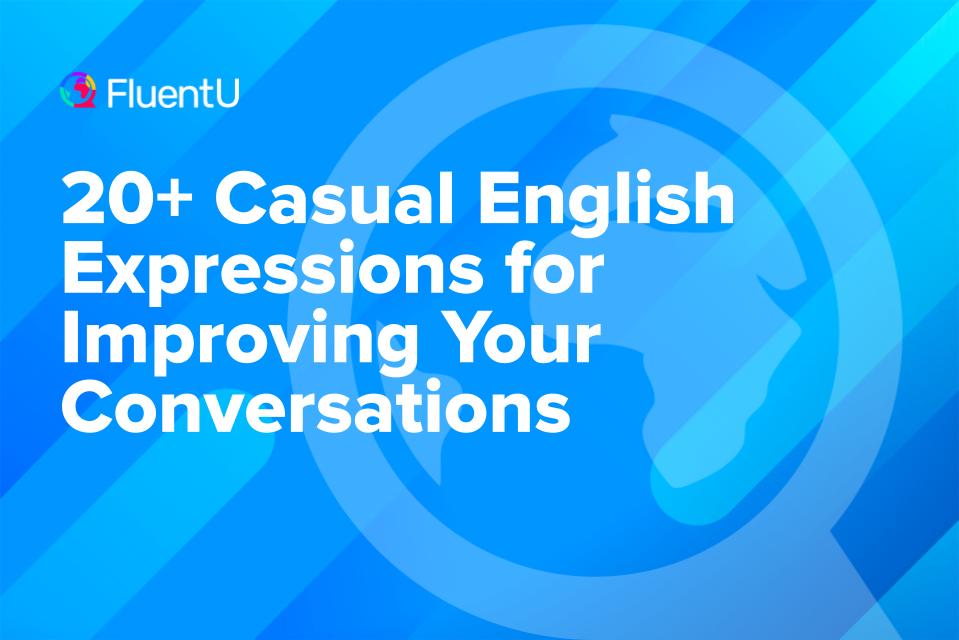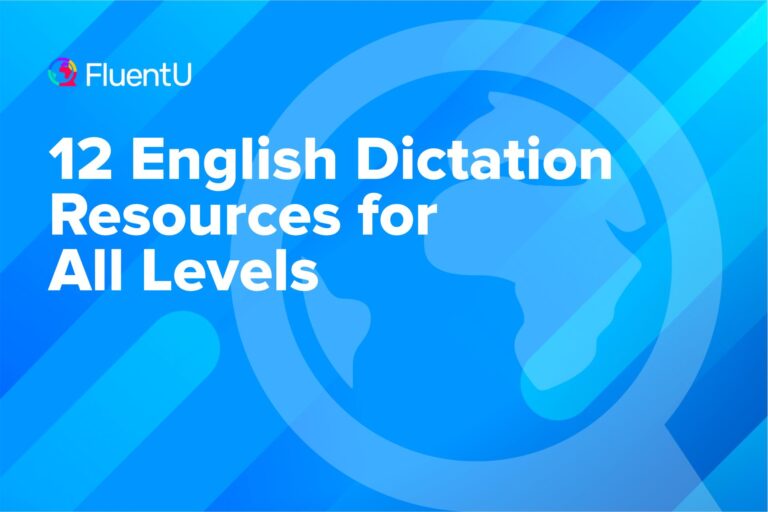Contents
- Casual English Phrases You Need to Know
- 1. What’s up?
- 2. How’s it going?
- 3. I get it
- 4. Let’s hang out
- 5. That’s awesome
- 6. No big deal
- 7. Legit
- 8. Chill
- 9. Totally
- 10. I can’t even
- 11. Whatever
- 12. I’m broke
- 13. It’s a long shot
- 14. Off the top of my head
- 15. Give me a break
- 16. Feeling under the weather
- 17. Get a kick out of
- 18. For real?
- 19. Binge-watch
- 20. Fair enough
- Types of Casual English
- And One More Thing...
20+ Casual English Expressions for Improving Your Conversations

Textbooks rarely give insight into real conversations. Learning casual English is vital if you want to understand and be confident when communicating with native speakers.
Find out what it means to get a kick out of something or when it makes more sense to use “I’m” instead of “I am” all in this guide. I also cover the different types of casual English you should know about.
Casual English Phrases You Need to Know
1. What’s up?

This is a very casual way of saying hello while also sneakily (indirectly) asking, “How are you?” or “What are you doing?” You can use this when you’re greeting a friend.
“Hey, Jake! What’s up?“
“Not much, just grabbing a coffee. How about you?”
2. How’s it going?
Here’s another greeting that’s similar to “What’s up?” What’s nice about this is that the other person can respond however they want—they can give you an update about their life, or simply start talking about any other topic.
“Hey, long time no see! How’s it going?“
“Oh, pretty good. I’m going to a party later.”
3. I get it
This is a straightforward way of expressing that you understand what the other person is saying. It can be on a logical level, but it can also be in an emotional sense, meaning that you’ve also had a similar experience.
On the other hand, if you’re confused, there’s also the opposite expression: “I don’t get it.”
“I just can’t deal with the traffic anymore.”
“I get it. I was so stressed yesterday because it almost made me late.”
4. Let’s hang out

If you have English-speaking friends, I guarantee that you’ll end up using this expression a lot. When you invite someone to hang out, it means you want to spend time with them in a relaxed way. This can be as simple as having a conversation or doing activities like going to a concert together.
Since you can also use this with a group of people, it’s meant in a friendly way. If you’re interested in someone romantically and you want to make that clear, you would instead say, “Let’s go on a date.”
“I got this new board game. Ever played Settlers of Catan?”
“No, but I’ve heard good things. Let’s hang out and try it!”
5. That’s awesome
“Awesome” is a casual adjective that’s similar to “great.” This expression is for when you admire or really approve of something and you feel happy about it.
You can think of it as ending with an exclamation mark—it’s always said with enthusiasm.
“I finally finished writing my blog post!”
“That’s awesome! Can’t wait to read it.”
6. No big deal
Have you ever gotten praised too much or you want a friend to stop apologizing to you about something minor? “No big deal” is a typical response to these.
It implies that things aren’t as important or as challenging as they seem. This is often meant in a positive way: to either give reassurance to someone so they won’t worry as much or to make your own achievements seem more normal.
“You managed to fix the car by yourself?”
“Yeah, it was no big deal, just a loose wire.”
7. Legit
“Legit” is short for “legitimate,” which means something is genuinely good, impressive or authentic. This is considered slang—it’s similar to “for real” or “honestly.” You can use it to emphasize or double down on what you’re saying.
“I didn’t think the movie would be good, but it’s legit one of the best I’ve seen this year.”
“Right? I told you!”
8. Chill
You won’t see this in formal textbooks, but “chill” is such a common word that it’s a must-know for English learners. “Chill” is essentially being relaxed—you’re not stressing about a situation.
It can also work as a verb. “To chill” means relaxing and having some downtime, usually with friends.
“Why are you so stressed about the party details?”
“You’re right. I need to chill.”
9. Totally
“Totally” is another word for agreeing with someone. In fact, it goes beyond a simple “yes.” It implies that you’re 100% agreeing with what the other person is saying, similar to “absolutely” or “definitely.”
“The last episode of that show was so emotional.”
“Totally! I cried throughout.”
10. I can’t even
This phrase actually came up first online and became so frequent that people now also say it out loud. It’s quite a flexible phrase—you’re so overwhelmed with emotion that words can’t fully describe it, and that emotion can be disbelief, surprise, disgust or even admiration.
The most typical way to use it is when something happens that’s really ridiculous or hard to understand.
“He tried to argue with his ex again at the convention, in front of everyone.”
“Seriously? I can’t even.”
11. Whatever
When used as slang, “whatever” signifies that you don’t care about what someone said or something that happened. It’s a more direct way to say something doesn’t matter.
Depending on your tone, it can sound a bit rude, so be careful with this! It’s definitely the most appropriate for friends. Sometimes people shrug too while saying it.
“I forgot to bring the snacks for the party.”
“Whatever, we can just order pizza.”
12. I’m broke

“Broke” means not having money.
It doesn’t automatically mean, though, that you’re in debt or your finances are really bad. People tend to say this casually when they turn down invitations or decide not to buy something because they don’t want to spend.
“Hey, wanna grab some sushi tonight?”
“I’d love to, but I’m broke.”
13. It’s a long shot
This expression was first used in sports—shooting, to be specific—and it had a much more literal meaning: hitting a distant target is a lot more difficult.
In everyday conversation, though, it just expresses that something only has a small chance of succeeding or happening. Despite this, it has a tone of hopefulness. The chances may be slim, but you think trying is still worthwhile.
“Do you think I could get that job with no experience?”
“It’s a long shot, but you might as well apply!”
14. Off the top of my head
When someone asks you a question, sometimes you don’t have the time to think hard about it, so you just blurt out what’s on your mind right now. You can then say, “Off the top of my head…”
This lets the other person know you’re giving a quick answer, not really one that’s well thought out or thoroughly researched.
“Who’s coming to the meeting tomorrow?”
“Off the top of my head, Sarah, Mike and Layla, but I’d have to check the list for the full attendance.”
15. Give me a break
This phrase has a frustrated tone. You think the other person is treating you in an unreasonable (unfair) way, and you want them to stop what they’re doing. During arguments, this phrase actually comes up a bit, in response to getting wrongly blamed or yelled at.
“I heard you’re the one who ate all the cookies.”
“Really? Give me a break!”
16. Feeling under the weather
Maybe you have a cold, you keep coughing or you’re just feeling very tired. In any case, you’re feeling worse than usual, although you aren’t seriously sick. There’s a casual expression for that: “feeling under the weather.”
It’s not certain where this phrase came from originally, but it might be related to the sad feeling that cloudy, stormy days tend to cause!
“Want to go out for a run?”
“Not today. I’m feeling under the weather.”
17. Get a kick out of
When someone says they “get a kick out of” something, it means they find it amusing or enjoyable. You can get a kick out of a hobby, a funny meme or even a friend’s strange habits.
There’s no direct connection to kicking in the physical sense. Instead, the “kick” here refers to a sudden burst of excitement and energy.
“Did you see that viral video of the dancing dog?”
“Oh, yes! I got a kick out of it!”
18. For real?
“For real?” expresses one emotion very strongly: disbelief, to the point that you’re almost questioning if what you heard is real. This is often used when you hear surprising news.
“I’m thinking about moving to New York next month.”
“For real? I had no idea you were considering that!”
19. Binge-watch

Ask people in English what their hobbies are, and chances are, a lot of them will include watching TV series. To “binge-watch” means watching several movies or TV series episodes one after the other.
“To Binge” describes consuming a lot of something all at once, like in the word “binge-eating,” but now you can also apply it to shows.
“I just started watching ‘Stranger Things’ last night.”
“Oh, it’s so addicting! I binge-watched the whole first season in a day.”
20. Fair enough
“Fair enough” is the expression you use when someone makes a point, and while you don’t fully agree, you understand the reasoning behind it.
It also implies that you don’t want to continue disagreeing about this, so it’s a polite way to move on to other topics.
“I didn’t invite Sandra because the last time she came, she caused a scene.”
“Fair enough, I understand why you’d want to avoid that.”
These phrases are incredibly common, so start listening for them when you watch TV or chat with your language exchange partner! You might also hear them being used in YouTube videos, podcasts, movies—practically most types of English media. You could also use a language learning program like FluentU.
FluentU takes authentic videos—like music videos, movie trailers, news and inspiring talks—and turns them into personalized language learning lessons.
You can try FluentU for free for 2 weeks. Check out the website or download the iOS app or Android app.
P.S. Click here to take advantage of our current sale! (Expires at the end of this month.)

Types of Casual English
To strike up conversations in English, being comfortable with casual English is important. It’s also the main type of English used on the internet.
Here’s a list of different types of casual English vocabulary:
Slang
You might start out learning more formal or official English, but eventually, you’ll have to get to know English slang. This type of casual English is either spoken out loud or used online.
While slang can come and go based on trends, there are tons of slang that have already become a common part of the language. Since English-speaking countries can have different cultures too, just keep in mind that they won’t always use the same slang.
Here is a lesson on American English slang from our YouTube channel:
Examples:
- Ghost — To suddenly stop talking to someone, especially online
- FOMO — An acronym for “Fear of Missing Out,” describing the anxiety over missing out on something fun or interesting
- Vibes — Feelings or mood, with “good vibes” meaning positive feelings
- Flex — To show off or display one’s wealth, talent or other advantages
- Bail — To leave or not participate in an event or situation
Contractions
Listen in on any English conversation, and you’re guaranteed to hear contractions. A contraction consists of two words that are linked together–in written form, there’s typically an apostrophe in between them.
For example, instead of saying “I am,” English speakers will often say “I’m” instead.
If you don’t use contractions, you’ll likely come off as sounding unnatural. Contractions aren’t used, though, in formal writing, such as for academic papers and business reports.
Examples:
Shortcuts and Acronyms
Acronyms are formed by taking the first letters of each word in a phrase and putting them together. They appear more often online. For example, the online term “PM” stands for “private message.”
Shortcuts typically remove the last parts of a word, such as “convo” instead of “conversation.” They can be used in both casual writing and speaking.
These past several years, there have been showing up all over because of how fast digital communication has become, especially with social media and quick texting.
Examples:
- LOL — Laugh Out Loud
- IDK — I Don’t Know
- OMG — Oh My God / Oh My Gosh
- Pics — Pictures
- Info — Information
Blends
Blends in English are formed by merging both the sounds and meanings of two words.
Unlike contractions, they usually don’t have apostrophes, and they’re created for the purpose of describing new ideas or situations.
They’re the least common type of casual English, but I’d say that they’re the most creative and fun!
Examples:
- Brunch (breakfast + lunch) — A meal between breakfast and lunch
- Blog (web + log) — A website where people write about specific topics
- Frenemy (friend + enemy) — Someone you act friendly with but don’t really like
- Guesstimate (guess + estimate) — A guess that tries to be accurate
- Spork (spoon + fork) — A combination of a spoon and a fork that lets you eat with only one hand
English as a language is constantly evolving, but the casual English phrases we’ve included above have been used for a while and are widely known. Try these out next time you see an English-speaking friend!
Casual English is everywhere, and if you make sure to talk consistently in English, soon you will be using it on your own, without thinking.
Download: This blog post is available as a convenient and portable PDF that you can take anywhere. Click here to get a copy. (Download)
And One More Thing...
If you like learning English through movies and online media, you should also check out FluentU. FluentU lets you learn English from popular talk shows, catchy music videos and funny commercials, as you can see here:
The FluentU app and website makes it really easy to watch English videos. There are captions that are interactive. That means you can tap on any word to see an image, definition, and useful examples.
For example, when you tap on the word "searching," you see this:
Learn all the vocabulary in any video with quizzes. Swipe left or right to see more examples for the word you’re learning.

FluentU helps you learn fast with useful questions and multiple examples. Learn more.
The best part? FluentU remembers the vocabulary that you’re learning. It gives you extra practice with difficult words—and reminds you when it’s time to review what you’ve learned. You have a truly personalized experience.
Start using the FluentU website on your computer or tablet or, better yet, download the FluentU app from the iTunes or Google Play store. Click here to take advantage of our current sale! (Expires at the end of this month.)










